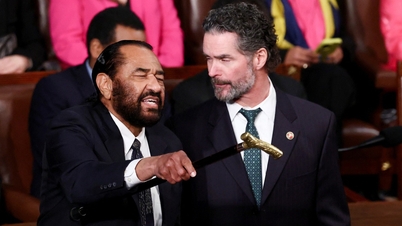US House Speaker Kevin McCarthy faces a challenge from far-right Republican lawmakers over the concessions he made earlier this year.
Matt Gaetz, a Republican congressman representing Florida, has been threatening for weeks to initiate the process of removing Kevin McCarthy from his position as Speaker of the House.
A day after Mr. McCarthy reached a consensus with Democrats to approve a resolution to keep the government running for at least 45 days, Gaetz repeated his attacks.
On October 1, Gaetz said the Republican Party needed "more credible new leadership" and announced that he would send a motion to impeach Mr. McCarthy. Gaetz, a member of the far-right minority in the Republican Party, was able to make such a bold threat because of Kevin McCarthy's own compromises earlier this year to win the election as Speaker of the House.

Republican Congressman Matt Gaetz (left) debates with Kevin McCarthy before the House Speaker election on January 6 in Washington, DC. Photo: Reuters
After winning the midterm elections in November 2022, the Republican Party became the majority in the House of Representatives with 221 seats, 9 more than the Democratic Party. On January 7, Mr. McCarthy gathered enough votes in the 15th round of voting after many days of stalemate, when he accepted many demands from the rebel faction in the party, including adjusting the criteria for lawmakers to propose a proposal to remove the Speaker of the House.
Under the standards adopted in 2019, the impeachment motion must first be voted on within the party. After being supported by a majority of party members, it can then be put to a vote in a plenary session of the House of Representatives.
But under a compromise earlier this year, Mr. McCarthy and his allies loosened the restrictions. The new rule allows any senator, Republican or Democrat, to introduce a resolution “declaring the office of the Speaker vacant” without further support from anyone else.
Once a motion is made, a member of the House must formally raise the matter in plenary and request a vote. Within two business days, the House must decide whether to accept or reject the motion.
In fact, it is still possible to block a motion to dismiss by preventing it from being voted on in plenary. A member of parliament can file a motion to suspend consideration of the motion or request that it be referred to a specialized committee for consideration.
If these efforts fail, the impeachment motion will be passed by a simple majority vote, or 218 out of 435 members of the House of Representatives. The House has never passed an impeachment motion, although it has been invoked twice, in 1910 and 2015, both times due to Republican infighting.
If Mr. McCarthy is removed from office, the House must immediately begin a new speaker election, but the process for selecting a candidate remains unclear due to the unprecedented nature of the event. Committees will continue to operate normally because their staffing structure will not be affected, but the full House sessions and votes will be suspended until a new speaker is elected.
To ensure the continued operation of the legislature, the US House of Representatives will have an acting speaker, based on a list of emergency successors prepared by Mr. McCarthy when he took office in January.

US House Speaker Kevin McCarthy answers the media in Washington on September 30. Photo: AFP
Kevin McCarthy has expressed in recent days that he is not afraid of challenges from Gaetz and far-right lawmakers, confident that he still has enough support from most Republican lawmakers. "Whatever they want, just do it. Let's get it over with and start leading for real," he told CBS on October 1.
But his position is not entirely secure. The Republicans are in the majority, but with only 221 seats, four more than the safe limit. If Gaetz can get more Republicans to back his impeachment, McCarthy's political fate could be decided by the opposing party.
Democrats have 212 members in the House of Representatives and have shown a high level of unity over the past nine months on issues of bipartisan confrontation. A typical example was the January election for Speaker of the House, when Democratic leader Hakeem Jeffries always received absolute support from his party with 212 votes in favor.
In the event that the Democrats want to try again to win the US House Speaker's seat, they have enough ability to gather all 212 votes to support the anti-McCarthy faction to gain a majority and pass an impeachment resolution.
On the other hand, Mr. McCarthy's faction can also seek to compromise with his colleague Hakeem Jeffries and the Democrats to gather enough votes in their favor in the voting sessions.
In the face of Republican infighting, Democrats have so far made it unclear whether they intend to intervene or stay out of the fray entirely. Two senior Democratic aides told NPR that groups within the party have begun informal discussions about a course of action but have yet to reach a common position.
Some Democrats don't want to appear to be "adding fuel to the fire." On the other hand, many are also not keen on the idea of "rescuing" Kevin McCarthy, not just because of partisan differences. They feel that Mr. McCarthy has thrown the House into chaos by giving too much power to the far-right from the start.
In addition to the compromises in January, Mr. McCarthy disappointed by avoiding condemning the attack on the US Capitol by supporters of former President Donald Trump in early 2021, or the decision to "greenlight" an impeachment investigation of President Joe Biden.
Mr Biden avoided directly commenting on whether Mr McCarthy should confront the far-right faction of the Republican Party, instead suggesting that the recent deadlock in negotiations with the far-right faction “was a wake-up call for the Speaker”.
Thanh Danh (According to NPR, Guardian, Reuters, CBS )
Source link




![[Photo] Binh Trieu 1 Bridge has been completed, raised by 1.1m, and will open to traffic at the end of November.](https://vphoto.vietnam.vn/thumb/1200x675/vietnam/resource/IMAGE/2025/10/2/a6549e2a3b5848a1ba76a1ded6141fae)



































































































Comment (0)